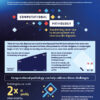Computational pathology
HPP was commisioned by AstraZeneca to develop a series of engaging resources to highlight the value of computational pathology and inspire action to improve access in cancer care
Context
Computational pathology is poised to transform cancer care by enabling faster and more accurate diagnosis.
The technology uses software – often powered by artificial intelligence – to analyse digital images of cells, and it is helping doctors diagnose diseases such as cancer more quickly and accurately.
As the number of cases of cancer rises globally, placing health systems under greater pressure, computational pathology is set to play a significant role by offering a more efficient diagnostic process and facilitating more personalised treatment.
Despite these benefits, computational pathology is not currently widely available in clinical practice. As with many advanced cancer diagnostics, challenges remain around investment in digital infrastructure and workforce training.
Translations

Infographic
Pathologie informatique: transformer les soins du cancer (French) Computergestützte pathologie: schnellere und genauere Diagnosen für eine bessere Krebsbehandlung (German) Patologia computazionale: transformare la cura del cancro (Italian) Patologia cyfrowa: transformacja opieki onkologicznej (Polish) Patología computacional: transformación de la atención oncológica (Spanish)What we’ve achieved
HPP has developed an infographic to communicate the crucial role that computational pathology can have in transforming the future of cancer care. Guided by comprehensive desk-based research, the resource aims to provide an accessible overview of the benefits of the technology and the barriers to its implementation. The infographic also outlines the action needed from policymakers and health system leaders to address these challenges and expand access for those who would benefit from it. The infographic is available in six languages: English, French, German, Italian, Polish and Spanish.
The infographic is accompanied by an animated video that explains the potential of computational pathology for a non-specialist audience, plus next steps for decision-makers to improve implementation. Translated subtitles are available in French, German, Italian, Polish and Spanish.
Project funding
This project was initiated and funded by AstraZeneca. The Health Policy Partnership (HPP) led the research and drafting. All content is non-promotional and evidence-based. AstraZeneca conducted a review of all project outputs for scientific accuracy. HPP retained editorial control over final content.
